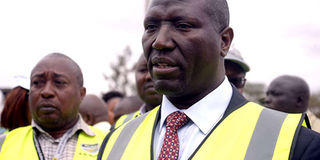State abandons bid to excise Uhuru Park for expressway

Kenya National Highways Authority Director-General Peter Mundinia gives journalists an update on the sprucing up of Kangudo Road on August 15, 2019. He has defended the building of the JKIA expressway. PHOTO | FILE | NATION MEDIA GROUP
What you need to know:
- The expressway will cost you an arm and a leg through a toll station amounting to Sh3.2 million individually by the time the Chinese concession ends in the next 30 years.
- It is a zero-return investment for Kenya and an outright rip-off, coming at a time when the World Bank has warned Kenya might find it hard to pay her debts for living beyond her means.
The government now says it has gone back to the drawing board and varied designs for the Jomo Kenyatta International Airport (JKIA) Expressway in order to leave Uhuru Park intact.
At the same time it announced a Sh4.3 billion package for land compensation for the project whose works have begun.
Infrastructure Principal Secretary Paul Maringa assured Kenyans that no part of the park will be touched.
“We have since varied the design and we shall make sure that Uhuru Park remains intact,” Kenya National Highways Authority Director-General Peter Mundinia explained, in what has been seen as a reaction to complaints by angry Kenyans on the original plan to excise 18 metres of the park to facilitate building of the expressway.
Prof Maringa stressed that not much will be affected in terms of land, saying there might be only a metre of incursion.
The much-touted JKIA-Waiyaki Way Expressway will cost you an arm and a leg through a toll station amounting to Sh3.2 million individually by the time the Chinese concession ends in the next 30 years.
GOOD INVESTMENT?
A quick arithmetic on the Sh6 toll charge per km for the 27km Mlolongo city section of the expressway being floated as the panacea for traffic congestion in the city shows a one-way journey would cost an average of Sh162 and a similar amount on the journey back, totalling to Sh320 daily.
So if you are using the route daily, one must budget for a handsome Sh10,000 a month, and by the time the year ends you will have paid the China Road and Bridge Company (CRBC) a whopping Sh 120,000.
It negates assertions by the project managers - including Eng Mundinia - that the project is meant to benefit Wanjiku.
“This project comes with a lot of goodies for the common people, including the fact that Mama Mboga can now easily transport her merchandise from say, Mlolongo to Nairobi,” he told a meeting with members of Kenya Editors Guild at a Nairobi Hotel Thursday.
Incidentally, all the monies collected will go to CRBC in an arrangement that will clearly disenfranchise the Kenyan taxpayer for generations to come.
TAX HOLIDAY
The justification for the investor-takes-it-all arrangement is devoid of any established microeconomic fundamentals, especially taking into consideration that Sh4.3 billion has been set aside for compensation of land owners who will be affected by the project.
Not to mention that all the larger chunk of the land belongs to the government.
It is a zero-return investment for Kenya and an outright rip-off, coming at a time when the World Bank has warned Kenya might find it hard to pay her debts for living beyond her means.
The CRBC will also enjoy a tax holiday for the period that the road will be under construction, at a time when Tanzania has stood its ground and in no uncertain terms asked a Chinese firm to pay taxes from day one if they were interested in a port project at Bagamoyo.
“Since the investor is taking all the risks without any risk to government, it is only fair that they take all the toll collected to offset their investments,” said Mr Maringa at the meeting.
ASTONISHING COST
Projected to cost Sh3.2 billion per km, Mr Maringa was hard-pressed to explain why this cost is a lot higher compared to similar projects in other countries, including Ethiopia.
“You need to travel out of this country and see those projects for yourselves. The terrain and the geological challenges are different,” he said, adding that some of the roads built in the rest of Africa are of low quality and high maintenance budget.
Drivers who do not prefer to use the expressway will still have the option of using the older Mombasa Road.
The undertaking, according to the government, will cost an estimated Sh59.9 billion and is projected to net Sh360 billion in taxes managed by CRBC who will construct, manage and receive all the monies from the expressway for 27 years.
Kenya Editors Guild President Churchill Otieno urged for more public participation on how the project will affect the common man.
“A serious social impact assessment must be carried out to see how the development will affect movement of persons living along the planned expressway,” he said.




